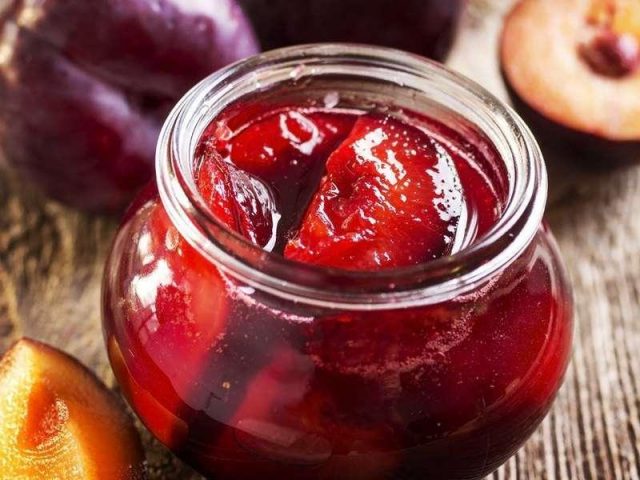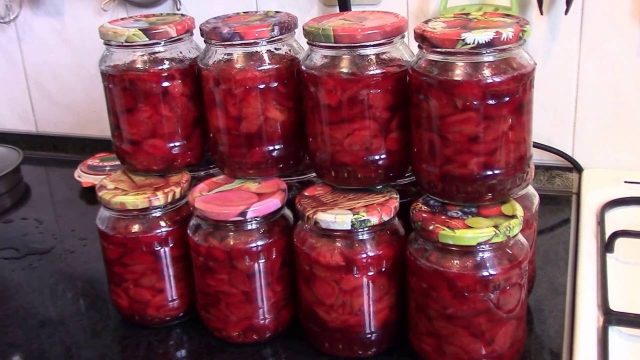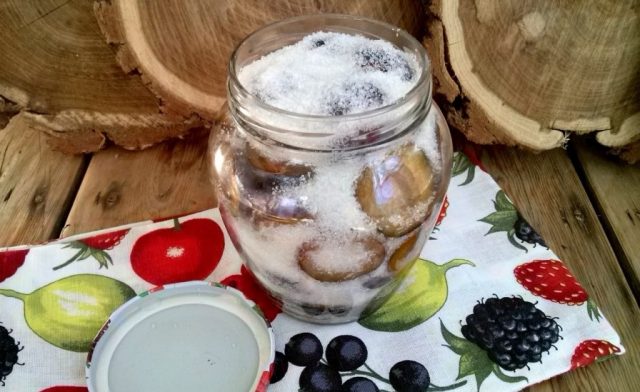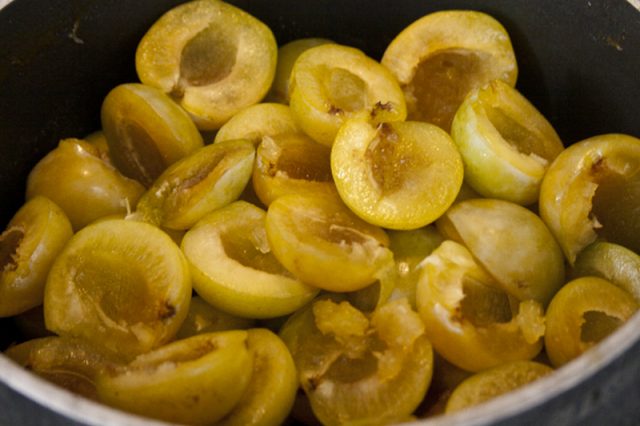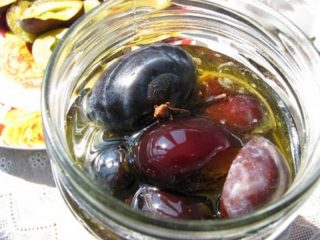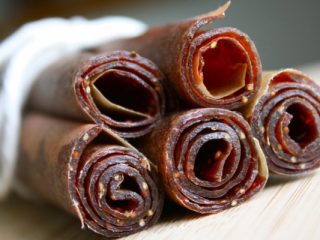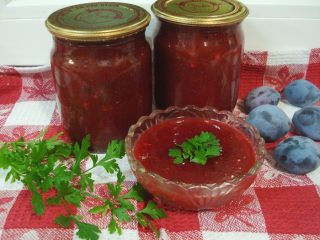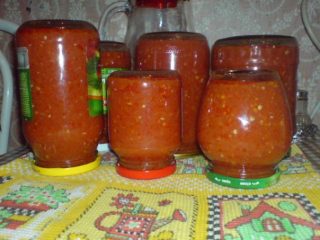Content
- 1 How to make plums in your own juice
- 2 Traditional recipe for plums in their own juice
- 3 Plums in their own juice with pits
- 4 Plums for the winter without sugar
- 5 How to roll up a plum in your own clove juice
- 6 Quick recipe for plums in your own juice
- 7 Blanched plums in their own juice
- 8 Yellow plum in its own juice for the winter
- 9 How to make a yellow plum in your own vanilla juice
- 10 Cooking plums in their own juice in the oven (or in the oven)
- 11 Canned prunes in their own juice
- 12 Halved canned plums in their own juice
- 13 Rules for storing plums in their own juice
- 14 Conclusion
Plum in its own juice is one of the options for preparing these fruits for the winter at home. You can harvest them with or without seeds, only the plums themselves with sugar or with the addition of certain seasonings. You can learn how to cook plums in your own juice from this article, where detailed recipes with step-by-step guidance, photos of the finished product and a video of preparation will be given.
How to make plums in your own juice
For the preparation of this winter harvest at home, ripe fruits are suitable, ripe on a tree and slightly unripe, that is, those that have almost reached biological maturity, but still have dense pulp. All of them must be exceptionally intact, without damage, dents, rot spots and traces of any infections and diseases, without stalks.
The variety of plums does not matter, you can take any, fruits of any shape and color will do. As for the size, the ideal option is medium, but large and small can also be canned.
The containers in which you can preserve fruits are ordinary glass jars of various sizes, from 1 to 3 liters. They must be intact, without chips or cracks, preferably hardened, that is, such as were previously used for canning. Before placing a drain in them, the jars must be washed in warm water with soda, heated over steam and dried. Sterilize the lids in boiling water too. You will also need a large pot for sterilization, so high that cans can be freely placed in it in water poured over a hanger.
Then prepare the plum fruits: wash them several times in warm water, removing all adhering dirt and dust from them. After that, cut each fruit in half along the longitudinal line and remove the seeds, if provided in the recipe.
Traditional recipe for plums in their own juice
To prepare plums in your own juice according to a recipe that is considered traditional, you need a minimum of products, only 2 ingredients:
- plum - 10 kg;
- sugar - 5 kg.
You need to cook plum jam for the winter like this:
- Remove all tails and bones from the washed fruits, pour them into 1-1.5 l jars, sprinkling each layer with granulated sugar. Lay tighter, tamp lightly.
- Pour some warm water on top and shake well to mix everything.
- Put a piece of cloth or a special stand on the bottom of a large volumetric saucepan, put jars on it and pour warm liquid over the hangers.
- Put a saucepan on fire and bring water to a boil.
- When the water starts to boil, reduce heat to low and simmer for 15 minutes.
- Under the influence of heat, the plums will gradually begin to settle, and free space will appear in the banks. It needs to be filled with new portions of fruit and sugar.
- After adding, sterilize again for another 15 minutes.
- After the allotted time has passed, remove the cans from the pan, grabbing them with a special device, and immediately roll up the lids.
- Leave to cool at room conditions for exactly one day. It is not necessary to wrap them up, you can leave them as they are.
After cooling, the plums can be stored both in the cellars and indoors. They are sterilized, so they can withstand storage even in heat.
Plums in their own juice with pits
Here, the best option will be slightly unripe fruits, since they are denser than ripe ones, and retain their shape better even after prolonged heat treatment. There is no need to remove the seeds from them, so the fruit must remain intact. If you intend to preserve them in 3-liter jars, then the drain should be taken at the rate of 2 kg per 1 container. Ingredients are standard:
- 10 kg of freshly picked fruits;
- 5 kg of granulated sugar.
Plums for the winter without sugar
One can of 1 liter will need about 0.75-1 kg of plums. They can be round or oblong, fully ripe or slightly immature. The main thing is that they are as sweet as possible, since sugar is not added to them during cooking. It is better to take plums with small firm pulp. The fruits of the Hungarian (Ugorka) variety are ideal.
You need to cook these plums this way:
- Wash them, changing the water several times, and remove the seeds, carefully cutting each fruit with a knife along the longitudinal line.
- Fill the jars in halves to the top, sprinkling each layer with sugar and evenly distributing it inside the container.
- Place on the stove and sterilize for 10-15 minutes.
- Top up the plums and sugar when the first batch has finished.
- Sterilize again, but for 20 minutes.
- After removing the cans from the pan, immediately seal with a key using varnished lids and cover with a warm blanket.
After the jars with plums in their own sugar-free juice have cooled down, which will happen in about a day, transfer them to the cellar or put them on the shelf in the pantry.
How to roll up a plum in your own clove juice
This recipe for canning plums in their own juice differs in that, in addition to sugar, they also add a fragrant seasoning - cloves to the fruits to give them a peculiar smell. Otherwise, the same ingredients will be needed:
- 10 kg of fruit;
- 5 kg of granulated sugar;
- 2-3 cloves per liter jar.
Sterilize the plums for 15 minutes at first, and after adding new fruits instead of the shrunken ones - another 15 minutes. After cooking, leave the jars to cool for 1 day in the room. After that, if there is a cellar, then transfer it to it, where the conditions for storing canned products are better.
Quick recipe for plums in your own juice
This recipe is useful for those who cannot or do not want to sterilize jars for a long time. Ingredients:
- fruit - 10 kg;
- sugar - 5 kg.
The difference in cooking between this recipe and the previous ones is that:
- This time, the plums are not sprinkled fresh into the jars, but are first boiled in a saucepan along with sugar until juice appears from them.
- Then they are laid out in jars with a capacity of 0.5 to 1 liter along with the released juice.
- They are placed in a saucepan and sterilized for at least 15 minutes after the liquid has boiled.
After natural cooling, they are placed in a cellar, basement, or left in a cool room for long-term storage.
Blanched plums in their own juice
From the name of this recipe, it is clear that before cooking, the fruits will need to be blanched. For this:
- Put them in portions in a colander.
- It is dipped in boiling water for 5 seconds, then pulled out and immediately immersed in cold water.
- They are laid out in jars, evenly sprinkled with sugar, and set to sterilize for 15-30 minutes, depending on the volume.
- After plum, they take it out of the pan and immediately cork it.
After they cool down, put them in the cellar, in which they will stand until the next harvest.
Yellow plum in its own juice for the winter
To prepare plums in their own juice according to this recipe, you will need yellow fruits of any size and variety. Required components:
- 10 kg of fruit;
- 5 kg of sugar.
The cooking method is classic.
How to make a yellow plum in your own vanilla juice
According to this recipe, you will also need yellow varieties. You will need to take:
- 10 kg of fruit;
- 5 kg of sugar;
- 1 bag of vanillin.
You can also cook the workpiece in the classic way, but when laying fruit in a container, you will need to add a spice to it.
Cooking plums in their own juice in the oven (or in the oven)
The ingredients are the same as in the traditional recipe. Cooking method:
- Sort the fruits, wash in running water and be sure to remove the seeds.
- Fill 1-1.5 l jars with halves, pouring layer by layer and sprinkling with sugar. Place fruits tightly, pressing them down with a spoon.
- Place the jars in a preheated oven for 40-50 minutes.
- Then roll up immediately.
After cooling at room temperature, transfer the jars to a cool cellar.
Canned prunes in their own juice
You will need plums that are dense and not very juicy so that they can dry faster. Before making the jam, you first need to prepare the prunes. For this:
- Remove seeds from plums.
- Spread them in 1 thin layer outdoors, in the sun and dry for a long time until they acquire their characteristic consistency, color and aroma. Periodically they need to be turned over so that they dry well on all sides.
- You can also dry the fruits in the oven of a gas or electric stove.
From 10 kg of fresh fruit, after drying, approximately 3-3.5 kg of dried fruit is obtained. After the prunes are received, you can start making the jam:
- Divide it into prepared jars, add sugar (at the rate of 2 to 1).
- Add a little water, mix everything.
- Banks should be sterilized for 30 minutes.
Cooling takes place at room temperature. Jam can be stored indoors or in a cold cellar.
Halved canned plums in their own juice
To make jam according to this recipe, you will need to take ripe, juicy, but still dense fruits in the amount of 10 kg. Plums can be of any color: white, yellow, red and dark blue. You will also need sugar (5 kg). Sequencing:
- Wash the fruits, cut them lengthwise with a sharp knife and remove the seeds from them.
- Put the halves in jars, sprinkle with sugar evenly.
- Sterilize according to a traditional recipe.
After the obligatory cooling, send the cans for storage.
Rules for storing plums in their own juice
You can store the workpieces both in the house at a relatively high temperature, since they have been sterilized, and in a specially designated place - in the cellar. Indoors, in an apartment or in a private house, you need to put them in the coldest and darkest place, for example, in a pantry or in the coldest room. The shelf life of plums in their own juice at home is at least a year, but not more than 3 years. After this period, it is not recommended to use plum jam for food, it is better to cook a new one from the current year's harvest.
Conclusion
Many people will like plums in their own juice, as they have an unsurpassed taste and aroma. It is not difficult to prepare it, you just need to adhere to the recommendations given in the recipes. If you do everything right and cook the jam properly, then you can feast on it on cold winter days when fresh fruit is not available.
